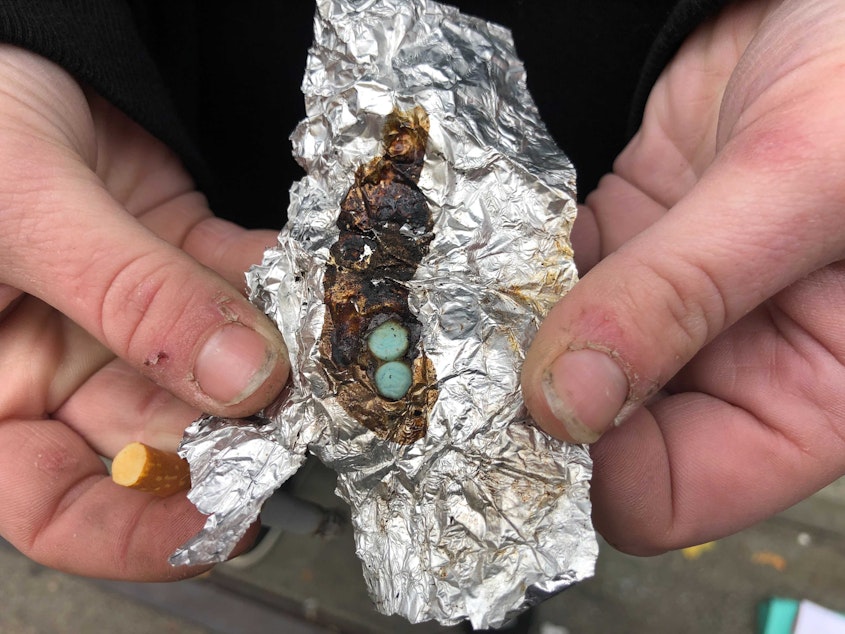How the implosion of WA’s drug possession law could spell disaster for addiction support services

The Washington Legislature adjourned Sunday without passing House Bill 5536. The bill would have replaced the state’s sunsetting drug possession law, making possession a gross misdemeanor.
Now the legal status of drug possession is in limbo – along with $270 million worth of services that the bill would have put into place for people with addictions.
“I saw this as a once-in-a-generation, or once-in-a-lifetime, opportunity to advance how we think about and care for people with substance use disorder,” Caleb Banta-Green told Seattle Now. “I'm saddened to see it looking like it may be withering away.”
Banta-Green is a research professor in the University of Washington School of Medicine, focusing on public health and health care responses to substance use disorder. He helped shape key parts of the bill related to supports for people using drugs.
The stakes for this work are high. A thousand people died from overdoses in King County last year, a record-breaking number largely fueled by the spread of fentanyl.
This year, the county is on track to break that record again. More than 400 people have died just in the past four months. The numbers for all of Washington state are roughly double the death toll in King County.
“I think it's important to realize that doing nothing means maintaining the status quo, and the status quo is horrific,” Banta-Green said.
Listen to Caleb Banta-Green’s full conversation on Seattle Now by hitting the play button above, or searching “Seattle Now” in any podcast app.
Health Engagement Hubs
A key part of the bill – and a key disagreement between Democrats and Republicans in the Capitol – is Washington’s diversion program.
This system lets people with a substance use disorder to accept treatment instead of doing jail time. There’s just one problem: The state doesn’t have adequate services in place to treat all the people arrested for drug-related charges.
HB 5536 would have created 39 drop-in health hubs across the state with a variety of easy-to-access services. The plan was modeled on Banta-Green’s work running similar sites through a research program at UW.
“The premise of these health engagement hubs for people who use drugs is to make services easier to get than the drugs that people are addicted to,” Banta-Green explained.
Those services might be full-on addiction treatment. But many people aren’t ready for that step. Instead, they may start with health care, housing assistance or other services that meet them where they are.
“The idea is that there's something for everybody, every day. And that's really important — that everybody has somewhere to go to get necessary services,” Banta-Green said.
Without those hubs, the only option is to send people to intensive treatment programs. Those aren’t good options for many people and they have far fewer spots than needed.
“We're just stuck. I don't see how we move forward to actually improve the health of individuals and their communities,” Banta-Green said.
Making harm reduction easier
The bill also included measures that would allow for more harm reduction services. Needle exchanges and safe injection sites are examples of harm reduction services — places that help reduce overdoses and other health hazards related to drug use.
But, as Banta-Green points out, Washington’s current harm reduction rules are focused on drugs that are injected. The rise of fentanyl, which is smoked, means more and more people need a new kind of care.

“There are many reasons to provide smoking supplies,” Banta-Green said. “They can reduce some risks of infection and burns and cuts and such. But they also make a reason for people to come in.”
Once those with substance abuse disorders have a connection to a service provider, they are more likely to accept other services, including treatment.
HB 5536 would have legalized smoking tools, allowing existing harm reduction services to offer them to users.
Another piece of the bill would have legalized tests for certain drugs, identifying harmful additives. These additives are common in fentanyl pills and can be deadly.
“Emergency departments need this,” Banta-Green said. “They don't know what types of wounds or overdoses they're facing without this information.”
His office fields questions constantly about what exactly is in the drug supply in Washington state. The reality is: We just don't know.
“Unfortunately, at least for the time being, our ability to get that information is really being stymied by the lack of action at the Legislature right now,” he said.
A shift in perspective
Perhaps the largest disappointment for Banta-Green in the bill’s implosion is the loss of progress in shifting perspective on substance use disorder and how to help people experiencing it.
“My conversations with legislators often came back to, ‘We need a way to force people into treatment for their own good,’” he said. And while there’s an understandable motivation behind that approach, “the evidence base does not support that.”
“What is missing there is an understanding that if you offer people the right services, the vast majority will take advantage of it,” he said. “They don't need a stick if you have a delicious carrot.”
This hits Banta-Green hard because he sees the impact these services would have on people across Washington. He hears from people addicted to fentanyl who are afraid of dying, but don’t know how to start getting help or where to go when they are in a crisis.
“I thought that we were getting to a better understanding about what substance use disorder is and what are effective treatments and what are effective services,” he said. “But it feels like things have just evolved back into the blame game and polarization and nothing happening.”
This story is based on an episode of Seattle Now, KUOW's news podcast. Hear this episode by clicking the play button above and find more local news stories by subscribing to Seattle Now in any podcast app.





